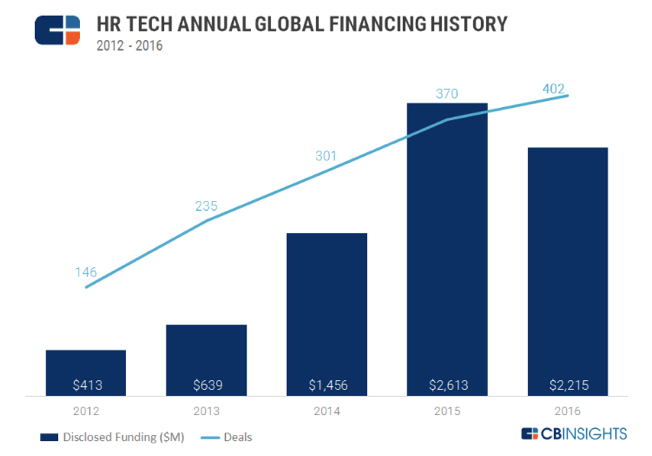TX Zhuo
Breakthroughs in HR tech are not only giving employers game-changing tools with which to enhance processes and attract the best talent, they’re also solving longstanding labor gremlins, such as gender pay parity and blind hiring. At the same time, they’re giving employees novel means by which to accrue and auto-tag prequalifying skill sets for job scenarios far beyond their current positions. But there are opportunities in matching current/future employee needs with what employers can offer.
In January, Gartner projected that HR tech would drive growth in worldwide IT spending in 2018. I’ve spent the last few months better understanding the landscape, so I’m better-positioned to gauge how the cards will fall. I interviewed 10 leaders in human resources — thanks to people like Jan Fiegel (SideWalk Labs), Parker Barille (former VP Product LinkedIn), Cindy Gordon (Policygenius). Here’s what I gleaned.
First, let’s clarify misconceptions
HR tech is a huge space
Yes. It will be, but it is still not that big today. The global HR tech industry is estimated at $400 billion, but investments are sensitive to economic shifts. Deal activity in HR tech has increased steadily since 2012, or 175 percent from 2012 to 2016, as shown in the chart below. But investment dollars peaked at $2.4 billion in 2015. In 2016, there were 402 deals worth approximately $2.2 billion in funding, and 2017 closed out with about $1.1 billion in funding for HR tech companies.

Diving in deeper, current spend on HR is small compared to most other functions within a company. For example, while the global HR software market is forecast to grow at a compound annual growth rate (CAGR) of 2.4 percent, reaching $9.2 billion by 2022, Gartner shows Customer Relationship Management (CRM) at a $36.5 billion worldwide market in 2017.
But, the venture opportunity with HR tech will grow over time, fueled by social pressures, by industry need for data and efficiency, and to rise above in a competition for top talent.
HR benefits platforms are the next big thing
A new workforce generation is driving exciting use cases for HR benefits platforms. Companies are hatching creative perks for employees, such as adopting progressive health plan “plus” platforms like Robin Care or LUCY, a service for employees with families, whose motto proclaims that it “helps employees love the family they grow and grow the career they love.”
But platforms like these could potentially be on the chopping block if recessions strike. A change of mindset and a saturation threshold will need to be reached for employers to accept these as “indispensable” employee needs and not just exotic perks for the millennial crowd. That said, I’m cautiously bullish on these platforms and would love to see them succeed.
We have some ways to go before HR benefits platforms prove sticky in the post-recession era. According to a Bloomberg BNA report, HR department budgets grew ~4-7 percent annually before the Great Recession, just 2 percent in 2009 and have only semi recovered to a 4 percent annual growth rate. Sustained market growth will be key to ensuring that value-added platforms become the new normal.
What still rings true
Companies still want better candidate assessment tools
LinkedIn only works for mid to senior-level hires. For fresh college grads and junior white-collar workers, it is hard to go off a traditional resumé because experience can be unconventional at best. It’s why companies like Portfolium and Strive Talent are finding creative ways to showcase skills and are boycotting traditional experience-based resumés. HireVue has a video-based assessment system that can literally read candidates’ faces and assess their honesty and the quality of their answers.
HR by VR (and AR) combines immersive experiences with efficiency, and there have already been significant investments in the space this year. Israeli startup ActiView, which has developed VR technology for assessing job applicants, raised $6.5 million in a Series A financing round from Teddy Sagi Group. AllyO, a provider of AI recruiting technology, raised a $14 million round.
Companies want to know what software to use
As the number of HR tech companies grows — just take a look at this HR tech landscape by Silicon & Salsa — companies at times struggle with the overabundance of choice. A platform to find your best tech solution, like the Salesforce AppExchange, is a gap in the market to help companies navigate options. TechnologyAdvice is a good start, but the UI is not friendly or intuitive.
Beyond just picking the best-in-class app, there needs to be a data sync across different platforms to improve predictors around candidate attributes and future churn. With companies targeting segments of HR tech, there’s a clear need for an overarching data record system that can enable big data analysis across platforms.
HR staff spend too much time recruiting new employees
On average, the interview process spans 24 days in the U.S. Automation is key to decreasing the amount of time existing employees spend courting a candidate and interviewing, and there are platforms addressing these time-intensive tasks, as well as others.
The recruiting landscape is crowded, but ripe for experimentation with feature/benefit creep. Companies like LearnUp are not only helping companies schedule interviews and prep for them, they’re also adding to their platform skills-building lessons and job-coaching resources. Taking it one step further, companies like madeBOS are creating economic mobility for entry-level workers in retail and adjacent sectors by empowering employees to drive their own development, saving valuable HR staff time.
Matching skills to jobs for blue-collar workers enables high performance
When a restaurant recruits wait staff, they typically look for people who have worked at other restaurants. The same is true in retail. In finance, we always caveat previous performance or experience by indicating that it is not indicative of future performance. And this reliance on the past couldn’t be more misguided in hiring hourly employees, because it is the skills that matter — speed, good interpersonal skills, memory (for orders), etc.
If you were able to match skill sets only, a deckhand makes a great waiter. LA-based Talytica boasts an ability to assess cognitive ability, personality, strong career interests and specific job skills in the hourly talent management space, theoretically resolving this critical disconnect.
Imagine an enviable world in which employees have all the support they need to achieve the pipe dream of work/life balance. Or one in which candidates are sifted by skill and not the biases associated with background, gender or ethnicity. These are just two of the tectonic benefits HR tech can deliver across the board, connecting dots and leaving bare why certain deckhands could make exquisite waiters. Having explored this vertical, it’s clear to me that HR tech platforms are the surest way to yield the unquestioned must-haves the market now demands on both sides. It now remains to be seen which companies can deliver on engagement and codify this season’s visionary investment choice into the industry’s “new normal.”
Are you an entrepreneur with a fresh take on HR tech? Reach out and tell me more.































Comment